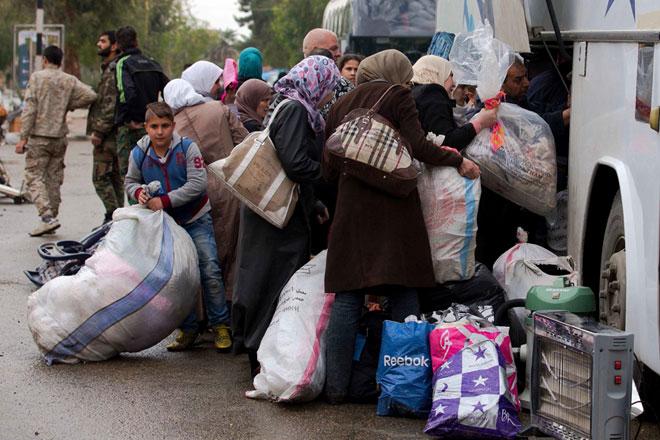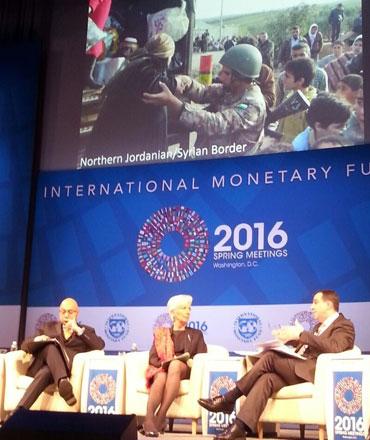You are here
Int’l community endorses initiative to support refugees, hosts
By JT - Apr 16,2016 - Last updated at Apr 16,2016

In this photo taken on Thursday, Syrian families load their belongings onto a bus in the town of Palmyra in the central Homs province, Syria (AP photo)
AMMAN – The World Bank Group (WBG) on Friday announced that eight nations and the European Commission pledged a multi-million package in support of Syrian refugees and host communities in Jordan and Lebanon, as well as recovery and reconstruction across the region.
According to a statement e-mailed to The Jordan Times, the World Bank-led financing initiative includes $141 million in grants, $1 billion in soft loans, $500 million in guarantees.
The statement added that the package means that the new facility will be able to generate up to $800 million in concessional loans next year.
Japan, France, the United Kingdom, the United States, Germany, Canada, the Netherlands, Norway and the European Commission each pledged their initial financial contributions to the New Financing Initiative to Support the Middle East and North Africa Region, said the bank, adding that the pledging occurred at a ministerial conference co-chaired by WBG president, UN secretary general and the president of the Islamic Development Bank (IDB).
The conference brought together ministers from G7, Gulf Cooperation Council, European and MENA countries, as well as the heads of various multilateral development banks and international organisations.
“Today’s strong show of support for the people of the Middle East and North Africa is an example of how the international community can come together to address major challenges,” WBG President Jim Yong Kim was quoted as saying in the statement.
“These grants mean we can now begin expanding programmes to help Jordan and Lebanon cope with the impact of the Syrian refugee crisis, while guarantees will allow multilateral development banks to increase their financing in support of countries across the region confronting the multiple consequences of instability,” he added.
“I am confident of mobilising additional support for recovery and reconstruction, and reaching our goal of raising $1 billion in grants over the next five years, which we will leverage to create $3 to 4 billion in much needed concessional financing.”
The new financing initiative was launched jointly by the WBG, the UN and the IDB in October of last year on the sidelines of the annual meetings of the International Monetary Fund and WBG in Peru.
The goal of the initiative is to rally the international community and improve coordination among international organisations, to meet the scale of both the MENA region’s humanitarian and development needs, said the bank’s statement, noting that the three organisations formed a working group which over the last six months, together with representatives of 26 supporting and benefitting countries, as well as nine regional and international organisations, has focused on developing the structure of the initiative and a roadmap for its implementation.
“The Syrian conflict continues to cause massive death, destruction and displacement. As we search for a political path towards peace, we also need a well-coordinated humanitarian and development response,” said UN Secretary General Ban Ki-moon.
Through innovative financing, the initiative plans to provide concessional financing to Jordan and Lebanon, the middle-income countries most severely impacted by the Syrian refugee crisis, expand the funding available to countries struggling with slow growth and high youth unemployment as a result of instability and to prepare for post-war reconstruction, according to the statement.
“The region faces enormous challenges and our development assistance is needed now more than ever, but it is critical that we unite to leverage our various comparative advantages,” Said IDB President Mohamed Ali Al Madani
Over 15 million people in the MENA region have been forced from their homes in the past five years due to conflict and instability, taking an enormous humanitarian and economic toll.
Along with the human suffering, immense pressures have been placed on the resources of host countries that were already facing significant economic challenges. In addition to the immediate costs, estimates to rebuild the war-torn areas are in the hundreds of billions of dollars. Ongoing instability has also contributed to a regional economic slowdown, even in countries not directly affected by conflict.
Related Articles
AMMAN – Minister of Planning and International Cooperation Imad Fakhoury on Monday described the financing facility for the region announced
AMMAN — The World Bank plans to offer $200 million in concessional financing (loans on favourable terms) to Jordan and Lebanon in response t
AMMAN — World Bank Group President Jim Yong Kim and United Nations Secretary General Ban Ki-moon are due on Sunday to start a visit to Jorda












